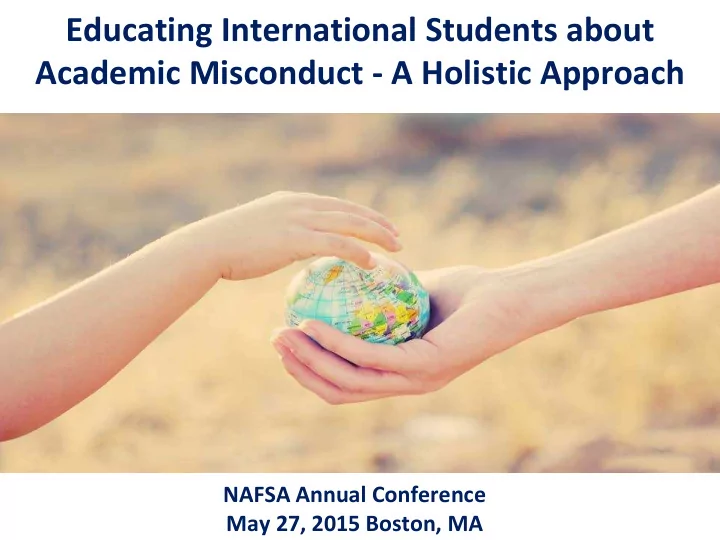

Educating International Students about Academic Misconduct - A Holistic Approach NAFSA Annual Conference May 27, 2015 Boston, MA
Introduction of Presenters Rosie Edmond Regional Director (REAC) Near East Asia & the Pacific EducationUSA, Tokyo Japan Emiko Christopherson International Student Advisor International Student Advising & Services Oregon State University Emily Lawton Care and Conduct Coordinator INTO Oregon State University Marigold Holmes Manager, Sponsored Student Program International Student Advising & Services Oregon State University
Our Approach ★ Understanding academic misconduct in modern higher education ★ Understanding international students & identifying the disconnects ★ Implementing a holistic approach to academic misconduct ○ Education ■ In country pre-departure orientation partnering with EducationUSA ■ Pre-Arrival online orientation ■ Post-Arrival orientation ■ Cultural immersion courses, workshops, and resources ■ Online Module ○ Support ■ Dedicated Care and conduct coordinator ■ Language and culture advisors Response NOT Reaction ○ ■ The conduct process ★ Soliciting Campus Community Collaboration
Did you know that among domestic students... • More than two-thirds report engaging in some form of academic dishonesty on tests, assignments, and homework • 73% of all test takers agree that most students do cheat at some point • 75% - 98% report to having cheated in high school • 80% of country's best students cheated to get to the top of their class • More than half said they don't think cheating is a big deal Source: Jaffe, 2015; McCabe, Butterfield & Trevino, 2012 A cademic misconduct is not unique to international students
I nternational Students’ Educational Contexts Educational context Domestic students International students Process oriented Results oriented Educational ● Self-authorship ● Good grades Goals ● Critical thinking ● High GPA Student Centered: Teacher Centered: Problem solving & Rote memorization Pedagogy knowledge application Emphasis on knowledge Emphasis on information Testing synthesis and recall application Facilitator of learning Expert provider of knowledge Faculty Role
Where is the disconnect? • Educational contexts – Results driven education vs process driven education – Acquiring knowledge vs liberal arts model of inquiry – Apprenticeship vs self-authorship • Cultural contexts – Absolute respect for authority vs the right to inquiry – Collectivist social norms vs respect for individuality – Text ownership in “real world” contexts vs “academic” contexts
So what can we do? – Stop stereotyping and stigmatizing international students – Promote a paradigm shift across campus Academic misconduct is not their problem - it is our problem
Preparing Students Before They Arrive So wEducationUSAhat caEducanE we do?Pre on Your Campus EducationUSA Pre-departure Orientation (PDO) • Classroom Culture and Academics • Expectations • Plagiarism • Honor Code
Collaborate with EducationUSA! So wEducationUSAhat caEducanE we do?Pre • Participate in PDO • Webinars • In country presentations • Train advisers
OSU Pre-Arrival Online Orientation ★ First implementation in Fall 2014 ★ Four modules ○ U.S. Culture ○ Academics and Academic Integrity ○ Health and Wellness ○ Student Engagement ★ Academics and Academic Integrity Module ○ Classroom styles - teacher centered vs student centered ○ Interactions with faculty ○ Academic integrity ○ Classroom culture and expectations
OSU Post-Arrival International Student Orientation ★ New to OSU Session ○ Degree-seeking level ■ Student Conduct office presentation ○ Language training level ■ INTO OSU presentation ★ INTO OSU Pathway Mini Conference ○ Academic Integrity and Misconduct Introduction ■ Academic integrity and academic misconduct ■ Five types of academic misconduct ■ Reasons, consequences, and strategies ■ Scenario questions in small groups ★ Progressor Visa and Academic Integrity Session ○ Review of immigration regulations and academic integrity
On-going Efforts ★ American Survival ○ Approach the issue from a cultural perspective ★ Educational module ○ Required module for INTO OSU Pathway students - associated with main Reading/Writing course ★ Translated materials ○ Student conduct code highlights in Arabic and Chinese ★ Integration with curriculum ○ Academic courses ■ Mechanics of citation, consistency with syllabus ○ Student services ■ Campus resources ■ Cultural mindset behind U.S. rules
INTO OSU student handbook
Working across Campus So what can we do? The Conduct Process ■ Response NOT reaction ■ International student support staff understand and contribute Support ■ Dedicated care and conduct coordinator ■ Language and culture advisors Working with Faculty ■ Cultural consultations ■ Training ■ Identify collaborators and experts
Online Module on Academic Misconduct ★ A New Initiative on Campus-Wide efforts in educating students about Academic Misconduct ○ Importance of sending a consistent message to students about academic misconduct ○ Unified message: OSU takes academic misconduct seriously ○ Cohesive and Collaborative approach in student success in their academic endeavors ○ Committee and collaboration with campus partners ★ Open online course for all students, especially international students, to learn terminologies, issues, and effects surrounding academic misconduct Credit: Stefanie Buck (Instructional Design/Ecampus Librarian)
Online Module on Academic Misconduct ★ Three Parts in Online Module ○ Part One: Terminology, Definitions, and Examples ■ Tampering, Fabrication, Cheating, Plagiarism & Assisting ○ Part Two: Issues, Cause, Effect and Strategy ■ Cause: pressure to succeed, responsibility to family and friends, time management, different definitions of academic misconduct ■ Effect: Student, Faculty, University and Community ■ Strategy: understanding culture; learning citations; resources ○ Part Three: Activity & Assessment with Certificate Option ■ Scenario questions, explanations and strategy ★ Interview videos from International Student Panels, Professor, Administrators, and Student Conduct office Credit: Stefanie Buck (Instructional Design/Ecampus Librarian)
References • Jaffe, D. L. (2015). Academic cheating fact sheet. Retrieved on May 24, 2015 from https://web.stanford.edu/class/engr110/cheating.html • McCabe, D. L. , Butterfield, K. D., & Trevino, L. K. (2012). Cheating in college: Why students do it and What educators can do about it. Baltimore, MD: Johns Hopkins University Press.
So what can we do? Thank you! Any Questions?
Recommend
More recommend